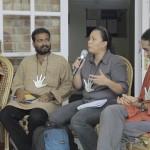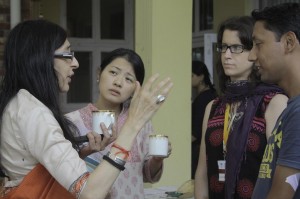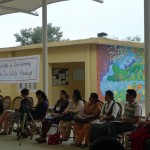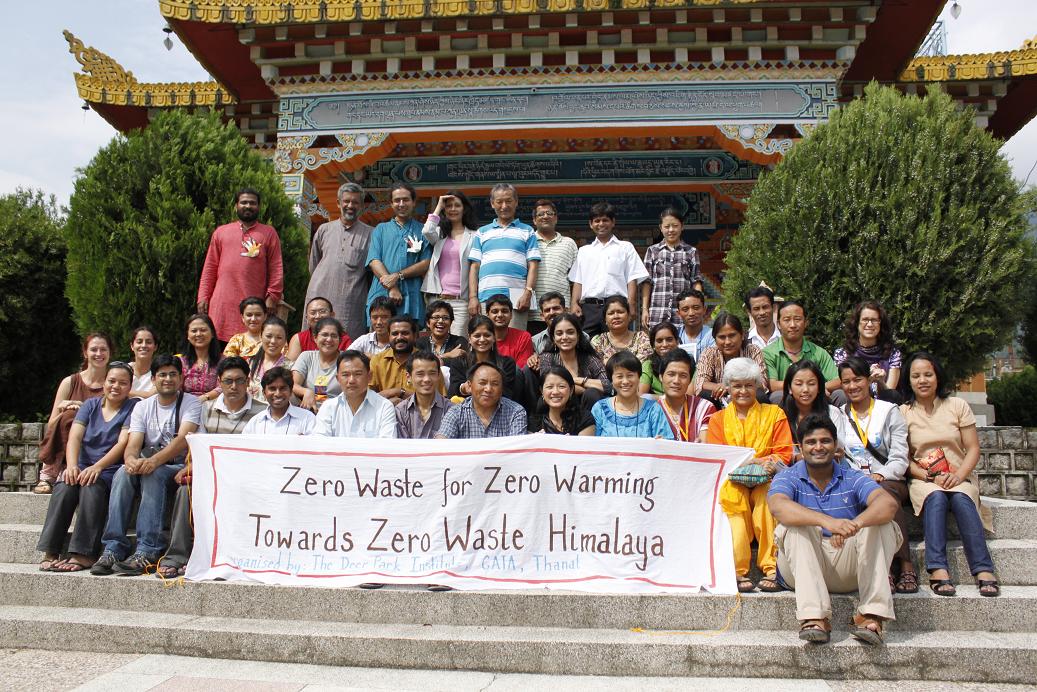The groups from Himalaya urge for ‘Zero Waste for Zero Warming’
Bir: 50 participants representing 24 organizations across the Himalayas assembled at Deer Park Institute in Bir, Himachal Pradesh from 5th to 8th August 2010 to discuss their concerns on climate change and waste, and decided to work together beyond borders to stop trashing Himalayas and to restore it to a clean, ecologically sound, just, peaceful and healthy Himalayas.

While inaugurating the workshop on 5th August 2010, Ms. Sarojini Thakur, Additional Chief Secretary to the Government of Himachal Pradesh stressed, “There is a need for realization of reducing consumption and change in life style patterns.â€
The participants shared their concerns over the environmental destructive practices like unsustainable waste management causing an increase in the greenhouse gas emissions adding to climate change impacts in the Himalayas. The participants felt that a concerted effort involving communities and Governments with a long-term programme can be the only solution over end-of-pipe dirty technologies.
“Find spiritual treasures, not trash;†Mr. Tshewang Dendup a social activist and movie artist from Bhutan commented while talking about the dream he has for a Zero Waste Himalaya.

“Himalayas are considered as the Third Pole in climate change dialogues. We have to recognize the importance of Himalayas in relation to climate change in the region. Disappearing glaciers and changed weather patterns show the intensity of the problem. It is time to work borderless, no matter where we are.â€
Mr. Prashant Varma, Director of Deer Park Institute, Bir, said.
“It is time to understand the importance of interdependence and to build relations among communities to face the challenges of waste and resource management,†Mrs. Kamala Bhasin from Jagori commented.
The workshop reiterated the need for awareness and education programmes to change the attitude and approach of people to reduce the use of plastics and wasting of resources.
The groups were concerned about big industrial projects that are polluting and threatening the fragile Himalayan eco-systems, and urged for building local economies and appropriate solutions for sustainable societies.

the founding member of Thanal said.
The workshop was concluded on 8th August 2010 with drafting of the ‘Bir Declaration on Zero Waste Himalayas’, where the groups decided to work together for a Zero Waste Himalaya through concerted actions and setting up pilot projects in India, Nepal and Bhutan. It further decided to observe 8th August as ‘Zero Waste Himalaya Day’ and to take stock of the progress of work in the meeting in 2011 in Nepal hosted by WomenAct.




Awareness is the first step. People have to understand that every individual should think about his own responsibility towards nature, ecology. Should think that little effort of every one can bring a very big change.
Bogus seminars and fake gestures to raise awareness with post intellectual discussions..who cares for their views? and who implements these hi-fi non practical ideas that exist only in making press releases while sipping coffe and wearing traditional INDIAN attire , Sarees and Kurtas..these “So Called’ environmentalists behave like saviors or ALIENS who feel sorry to see pollution on earth but but don’t have any authority or way to get things implemented on any platform..
All living like “Alice In Wonderland” and dreaming Utopian Ideas” Himalays kee bat baad me karo pehle apne shahr ya kasbe ke garbage disposal aur pollution control ka sochoa which is getting worse in every nook and corner of Himachal..just meet municipal committee authorities ..Nagar parishad occupants..who don’t even have time and equipment to deal with this menace & listen to your intellectual stories.
I wish zero waste is a reality!!
but according to my experience in this field, I could not find any place where this was achieved.
Cities which “claim” zero waste dispose tons of it into landfills because they have already banned other methods of disposal
whatever you do, manual of mechanical separation, there will always exist a fraction of waste which cannot further separated, recycled or composted. In places like himalayas, this will be less but in big cities, that fraction amounts to thousands of tons every year.
you can either landfill them or incinerate them, a better alternative to landfiiling
himachal ko men bachpan se dekh rah hun mera janm kullu jila ee ani tehseel men hua vahin par pada pala aj 60 sal ka hone ko hun ,in pahadiyon par jo badlav deha kkuchh ko dekh kar khushee hoti hea par is ke badle men jo kho gya hea uskee bharpai nahee ho sakti is ka dukh zyada hea